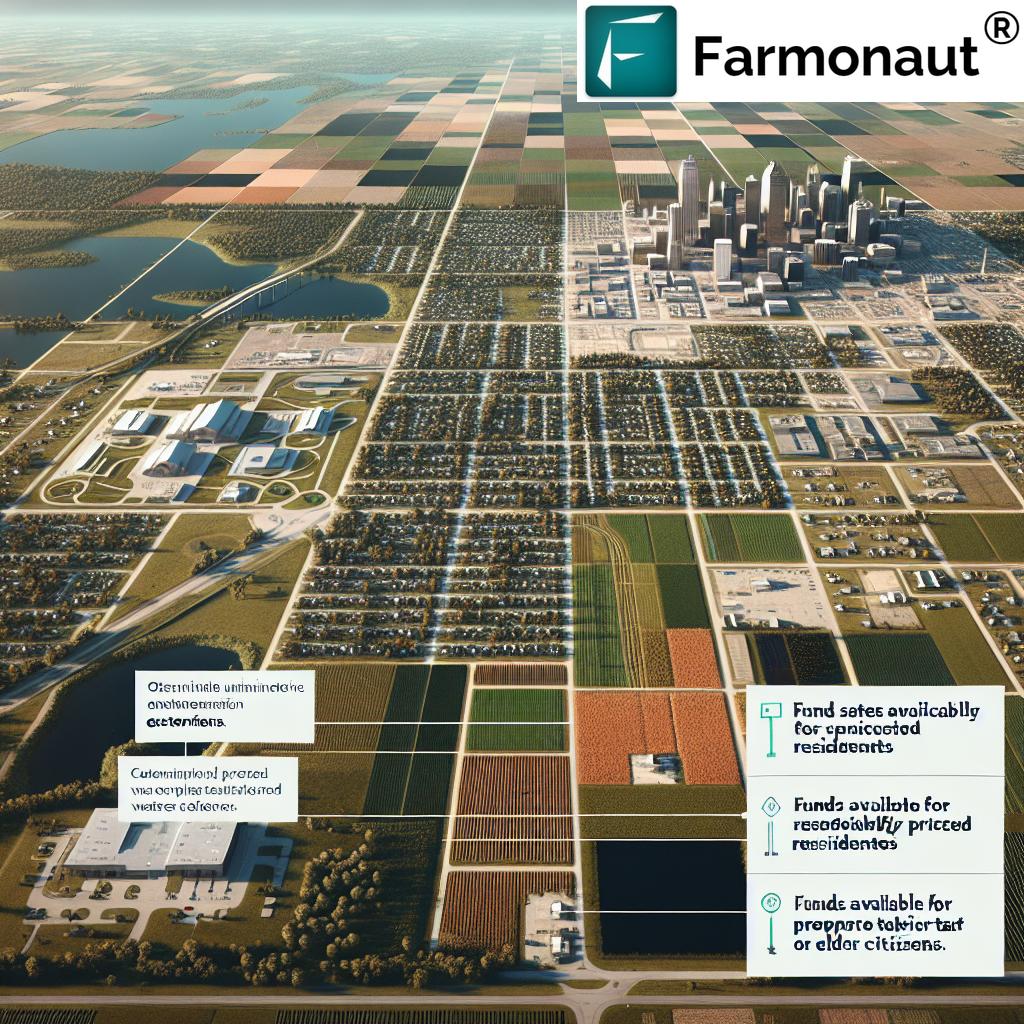McLean County Lawmakers Tackle Housing, Public Safety, and Farm Preservation in Illinois Legislative Priorities
“McLean County’s 2025 legislative plan targets housing shortages with affordable loan programs and utility infrastructure expansion.”
“McLean County’s 2025 legislative plan targets housing shortages with affordable loan programs and utility infrastructure expansion.”
In the heart of Illinois, McLean County is facing a series of pressing challenges that demand innovative solutions and collaborative efforts from local and state lawmakers. As we delve into the complexities of housing shortages, public safety concerns, and the preservation of family farms, it becomes clear that the decisions made today will shape the future of this vibrant community for years to come.
On a crisp Friday morning, members of Illinois’ 104th General Assembly gathered with the McLean County Board to discuss a wide array of issues that are shaping the county’s legislative priorities. The meeting, which took place in Bloomington, brought together a diverse group of legislators, including Sen. Dave Koehler, D-Peoria; Rep. Regan Deering, R-Decatur; Rep. Sharon Chung, D-Bloomington; Rep. Dennis Tipsword, R-Metamora; Rep. Jason Bunting, R-Emington, and Morgan Caracci, chief of staff for Sen. Chris Balkema, R-Channahon.

The 2025 Legislative Plan: A Roadmap for Progress
At the center of discussions was McLean County’s 2025 legislative plan, a comprehensive document outlining the county’s priorities and proposed solutions to address its most pressing issues. This plan serves as a crucial roadmap for both local and state officials, guiding their efforts to improve the lives of McLean County residents.
Let’s break down the key components of this plan and explore how they aim to tackle the county’s challenges:
1. Housing: Addressing Affordability and Availability
One of the most significant challenges facing McLean County is the shortage of affordable housing. The 2025 legislative plan proposes several strategies to address this issue:
- Utility Infrastructure Expansion: The county supports funding for the development of essential utilities such as water, sewer, and power systems. This infrastructure is crucial for new housing developments.
- Affordable Loan Rates: The plan recommends creating grant funding to support affordable loan rates for construction projects, making it easier for developers to build new housing units.
- Targeted Development: A focus on developing housing in areas of significant need, ensuring that resources are allocated where they’re most required.
McLean County Board Chair Elizabeth Johnston emphasized the severity of the housing crisis, stating, “We are struggling with the fact that we just don’t have enough housing.” This shortage not only affects new residents but also impacts the county’s senior population, who often struggle to downsize due to a lack of available homes.
2. Public Safety: Mental Health and Jail Management
Public safety concerns, particularly those related to mental health and jail management, feature prominently in the county’s legislative priorities:
- Jail Reimbursement: The county supports legislation calling for the Illinois Department of Human Services (IDHS) to reimburse jails for the care and treatment of detainees awaiting transfer to state-operated mental health facilities.
- Transfer Deadlines: Rep. Dennis Tipsword has introduced House Bill 1743, which aims to restore the 20-day transfer deadline for inmates deemed unfit to stand trial or not guilty by reason of insanity. This bill would also require IDHS to reimburse jails for every day beyond the deadline.
- Mental Health Services Funding: The legislative plan recommends restoring previous funding sources and identifying new ones for critical mental health services.
McLean County Board Vice Chair Jim Rogal highlighted the urgency of this issue, noting that as of the meeting day, the jail was housing 12 detainees in need of transfer to mental health facilities.
3. Agriculture: Preserving Family Farms
The preservation of family farms emerged as a crucial agricultural initiative in the discussions:
- Family Farms Preservation Act: Both Sen. Koehler and Rep. Chung expressed support for this act, which aims to raise estate tax exemptions for family farms from $4 million to $6 million.
- Estate Tax Relief: This initiative would provide significant relief to farm families, allowing for easier transfer of agricultural assets to the next generation.
“The Family Farms Preservation Act aims to increase estate tax exemptions for family farms in McLean County, Illinois.”
Infrastructure and Economic Development
Beyond housing, public safety, and agriculture, the 2025 legislative plan also addresses crucial infrastructure and economic development needs:
- Water Management: Funding for water infrastructure projects to ensure clean, reliable water sources for residents and businesses.
- Economic Growth: Support for programs that attract new businesses and foster job creation in the county.
- Transportation: Improvements to roads, bridges, and public transit systems to enhance connectivity and support economic activities.

The Role of Technology in Addressing McLean County’s Challenges
As we consider the complex issues facing McLean County, it’s worth noting the potential role that advanced agricultural technology could play in addressing some of these challenges. While not directly mentioned in the legislative discussions, innovative solutions like those offered by Farmonaut could provide valuable support to the county’s agricultural sector.
Farmonaut’s satellite-based farm management solutions offer tools that could help McLean County farmers optimize their operations, potentially increasing profitability and sustainability. This type of technology aligns well with the county’s focus on preserving family farms and supporting agricultural communities.
For instance, Farmonaut’s real-time crop health monitoring and AI-based advisory systems could help farmers make more informed decisions about resource management, potentially leading to increased yields and reduced costs. This could indirectly support the county’s economic goals by strengthening its agricultural base.
To learn more about how satellite technology is revolutionizing land use in agriculture, watch this informative video:
While Farmonaut is not directly involved in policy-making or local governance, its tools represent the kind of innovative thinking that could complement McLean County’s legislative efforts to support its agricultural community.
Balancing Growth and Fiscal Responsibility
One of the key challenges facing McLean County lawmakers is striking a balance between addressing pressing needs and maintaining fiscal responsibility. This is particularly evident in discussions around property tax exemptions for seniors.
The county supports the refiling and passage of Senate Bill 2030, which would raise the maximum income limitation for the low-income senior citizens assessment freeze homestead exemption from $65,000 to $75,000. While this measure would provide much-needed relief to seniors struggling with rising property taxes, it also poses a potential decrease in property tax revenue collections.
However, county officials estimate that the overall financial impact of this change would be minimal, demonstrating a careful consideration of both resident needs and fiscal stability.
Collaborative Approach to Problem-Solving
The meeting between McLean County Board members and state representatives exemplifies a collaborative approach to addressing local challenges. By bringing together officials from different levels of government, the county is fostering a comprehensive dialogue that considers multiple perspectives and resources.
This collaborative spirit is crucial for implementing effective solutions, especially when dealing with complex issues that span different jurisdictions and policy areas. It also reflects a commitment to transparent governance, as residents can see their local and state representatives working together to address community concerns.
Looking Ahead: The Impact of Legislative Priorities
As McLean County moves forward with its 2025 legislative plan, the potential impacts of these priorities are significant:
- Housing Development: Increased funding for infrastructure and affordable loans could lead to a surge in housing construction, potentially easing the current shortage and making homeownership more accessible to a broader range of residents.
- Mental Health Services: Improved funding and management of mental health services could reduce the burden on local jails, provide better care for those in need, and potentially decrease incidents related to untreated mental health issues in the community.
- Agricultural Sustainability: The proposed changes to estate tax exemptions for family farms could help preserve McLean County’s rich agricultural heritage, ensuring that farmland remains in the hands of local families for generations to come.
- Economic Growth: Investments in infrastructure and targeted development could attract new businesses to the area, creating jobs and stimulating economic growth across the county.
To gain more insights into precision crop area estimation, which could be relevant to McLean County’s agricultural initiatives, check out this case study video:
The Role of Data-Driven Decision Making
In today’s digital age, data-driven decision making is becoming increasingly important in governance and policy implementation. While not explicitly mentioned in the McLean County discussions, the use of advanced data analytics and technology could significantly enhance the effectiveness of the county’s legislative priorities.
For instance, tools like those offered by Farmonaut for agricultural management could provide valuable insights for policy makers. By leveraging satellite imagery and AI-driven analytics, county officials could gain a more comprehensive understanding of land use patterns, crop health, and agricultural productivity across the region.
This type of data could inform decisions related to:
- Zoning and land use planning for housing developments
- Assessment of agricultural land for tax purposes
- Monitoring of environmental impacts and sustainability efforts
- Targeted infrastructure development based on population growth and movement patterns
While Farmonaut’s specific tools are designed for farm management, the principle of using advanced data analytics for decision-making is broadly applicable to many of the challenges facing McLean County.
Community Engagement and Public Feedback
As McLean County moves forward with its legislative priorities, community engagement and public feedback will be crucial for success. The county board and state representatives should consider implementing robust mechanisms for gathering input from residents, businesses, and community organizations.
This could include:
- Town hall meetings to discuss proposed legislation and gather feedback
- Online surveys to gauge public opinion on key issues
- Partnerships with local universities for research and data analysis
- Regular updates and transparent reporting on the progress of legislative initiatives
By actively involving the community in the decision-making process, McLean County can ensure that its legislative priorities truly reflect the needs and aspirations of its residents.
Conclusion: A Roadmap for McLean County’s Future
The meeting between McLean County Board members and state representatives marks a significant step in addressing the complex challenges facing the region. From housing shortages and public safety concerns to the preservation of family farms, the 2025 legislative plan provides a comprehensive roadmap for progress.
As the county moves forward, the success of these initiatives will depend on continued collaboration between local and state officials, innovative problem-solving, and active community engagement. By leveraging technology, data-driven insights, and the collective wisdom of its residents, McLean County is well-positioned to create a more prosperous, equitable, and sustainable future for all its inhabitants.
The challenges are significant, but so too is the commitment and creativity of McLean County’s leaders and residents. As we watch these legislative priorities unfold, we can anticipate positive changes that will shape the county’s landscape, economy, and community for years to come.
Legislative Priorities Comparison Table
| Sector | Current Challenge | Proposed Solution | Potential Impact |
|---|---|---|---|
| Housing | Shortage of affordable housing, especially for seniors | Funding for utility infrastructure expansion, affordable loan rates for construction | Increased housing availability, improved senior living options |
| Public Safety | Overcrowded jails, inadequate mental health services | Jail reimbursement for mental health detainees, restored funding for mental health services | Reduced jail overcrowding, improved mental health care access |
| Agriculture | Difficulty in preserving family farms due to high estate taxes | Family Farms Preservation Act to raise estate tax exemptions | Easier transfer of farms to next generation, preserved agricultural heritage |
| Infrastructure | Aging utilities and transportation systems | Funding for water management and transportation improvements | Enhanced economic growth, improved quality of life for residents |
| Economic Development | Need for job creation and business attraction | Support for programs to attract new businesses | Increased employment opportunities, stronger local economy |
FAQ Section
Q: What are the main housing challenges in McLean County?
A: McLean County faces a shortage of affordable housing, particularly for seniors looking to downsize. The county is struggling with limited housing availability across various price ranges.
Q: How does the 2025 legislative plan address housing issues?
A: The plan supports funding for utility infrastructure expansion and affordable loan rates for construction. It also recommends developing housing in areas of significant need.
Q: What public safety concerns are being addressed?
A: Key concerns include jail overcrowding, particularly with detainees awaiting transfer to mental health facilities, and the need for improved funding for mental health services.
Q: What is the Family Farms Preservation Act?
A: This proposed legislation aims to raise estate tax exemptions for family farms from $4 million to $6 million, making it easier to transfer farms to the next generation.
Q: How is McLean County balancing growth with fiscal responsibility?
A: The county is carefully considering measures like property tax exemptions for seniors, estimating minimal financial impact while providing relief to residents.
Q: What role could technology play in addressing McLean County’s challenges?
A: While not directly mentioned in the legislative plan, advanced technologies like satellite-based farm management solutions could support agricultural sustainability and inform policy decisions.
For those interested in exploring innovative agricultural technologies, consider checking out Farmonaut’s solutions:
For developers interested in integrating agricultural data into their own applications, Farmonaut offers an API:
Earn With Farmonaut
Earn 20% recurring commission with Farmonaut’s affiliate program by sharing your promo code and helping farmers save 10%. Onboard 10 Elite farmers monthly to earn a minimum of $148,000 annually—start now and grow your income!
Learn more about the Farmonaut Affiliate Program
Farmonaut Subscriptions
As McLean County continues to navigate its complex challenges, the collaborative efforts of local and state officials, combined with innovative solutions and community engagement, will be key to realizing the vision outlined in the 2025 legislative plan. By addressing housing shortages, improving public safety, preserving agricultural heritage, and fostering economic growth, McLean County is laying the groundwork for a prosperous and sustainable future for all its residents.
















